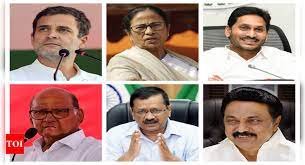Senior Congress leaders from Delhi and Punjab convened at the All India Congress Committee (AICC) to discuss the crucial issue of extending support to the Aam Aadmi Party (AAP) in its battle against the Centre’s recent ordinance. This controversial ordinance effectively nullifies a Supreme Court verdict that had granted the AAP-led Delhi government control over certain services.
Among the attendees at the meeting were prominent figures such as Partap Singh Bajwa, the Leader of the Opposition in the Punjab Assembly, as well as senior Delhi Congress leaders Ajay Maken and Sandeep Dikshit. However, despite their presence, these leaders took to various social media platforms to express their opposition towards extending any form of support to the AAP.
The backdrop of this gathering revolves around a recent ordinance introduced by the central government that seeks to curtail the powers of the Delhi government. The ordinance effectively aims to negate a significant Supreme Court verdict that had granted the AAP-led administration control over key services in the national capital. This move has sparked a heated debate on the balance of power between the central and state governments.
The Aam Aadmi Party, led by Chief Minister Arvind Kejriwal, has been fighting vigorously against this ordinance, arguing that it infringes upon the democratic rights of the elected government in Delhi. The party maintains that the Supreme Court’s earlier decision upheld the principles of federalism and autonomy, allowing the Delhi government to exercise greater control over areas such as law enforcement, public services, and land management.
While the AAP has been actively seeking support from opposition parties to mount a strong resistance against the central government’s decision, the Congress leaders attending the AICC meeting have chosen to voice their disagreement. Their opposition to supporting the AAP seems to stem from a difference in political ideology and strategic considerations. They believe that lending support to the AAP could inadvertently strengthen their political rivals and undermine their own party’s position in the long run.
Ajay Maken and Sandeep Dikshit, both influential figures within the Delhi Congress, have taken to social media to express their dissenting opinions. Through their online platforms, they have made it clear that they do not endorse extending any support to the AAP in their fight against the ordinance. While their statements represent their personal views, it is noteworthy that their stance may influence the overall decision-making process within the Congress party.
The Congress party finds itself at a crossroads with this issue. On the one hand, supporting the AAP’s cause could potentially unite opposition parties against the central government and enhance the party’s overall political standing. On the other hand, opposing the AAP’s efforts may be seen as an attempt to protect the Congress party’s own interests and prevent the further growth of a regional rival.
This internal debate within the Congress party highlights the complex nature of Indian politics, where strategic calculations, ideological differences, and the pursuit of political advantage often shape decision-making processes. As the discussions continue, it remains to be seen how the Congress party will navigate this issue and whether they will ultimately lend their support to the AAP or maintain their opposition stance.


